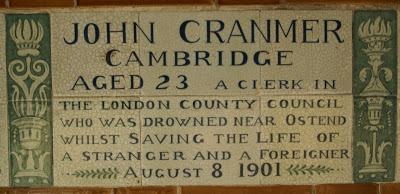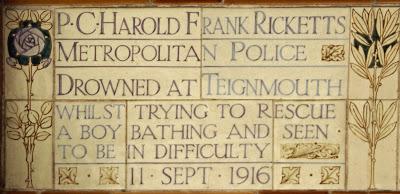
John Cranmer Cambridge was described by those who knew him as endowed with the gift of sympathy and happy in the service of others. He went to Ostend with his brother and sisters; ferries sailed to this popular Belgian resort from Dover. It featured a Kursaal (casino) and long, sandy beaches and had been patronised by the Belgian royal family: an unlikely setting for tragedy.
The siblings were bathing on the beach one day when they heard shouts from a man and woman who had got into difficulties in the sea. John knew that the current could be dangerous, but didn't hesitate to enter the sea while his siblings looked for a boat. Initially, the rescue was successful: he helped the woman onto the boat. Unfortunately, he then disappeared from view and his body would only be recovered later. He was buried in Ostend, but is also commemorated here on the Watts Memorial. Always particularly impressed by self-sacrifice for strangers, the memorial makes particular mention that in this case they were foreigners too:
JOHN CRANMER CAMBRIDGE AGED 23, A CLERK IN THE LONDON COUNTY COUNCIL WHO WAS DROWNED NEAR OSTEND WHILST SAVING THE LIFE OF A STRANGER AND A FOREIGNER, AUGUST 8 1901
The English resort of Teignmouth was to prove equally dangerous for holidaying police constable Harold Frank Ricketts. This Devon town had become fashionable in the Georgian period, and its popularity further increased with the coming of the railway in 1846. In 1916, it must have seemed a pleasant retreat from war-obsessed London and its Zeppelin bombing raids - although Teignmouth would by no be means untouched by World War I, with over 175 men from the town losing their lives.
However, for this London police officer, his holiday in Teignmouth would prove fatal. Ricketts was taking his annual leave in the town, visiting his mother-in-law with his new wife, and took a boat trip with the family. They saw a boy who had got into difficulties swimming in deep water; Ricketts rowed over to attempt a rescue. Sadly, when he reached him, the panicking boy pulled at him and overturned the boat. Its other occupants - and the boy - were rescued; Ricketts, who couldn't swim, died.
PC HAROLD FRANK RICKETTS, METROPOLITAN POLICE, DROWNED AT TEIGNMOUTH WHILST TRYING TO RESCUE A BOY BATHING AND SEEN TO BE IN DIFFICULTY, 11 SEPT 1916


